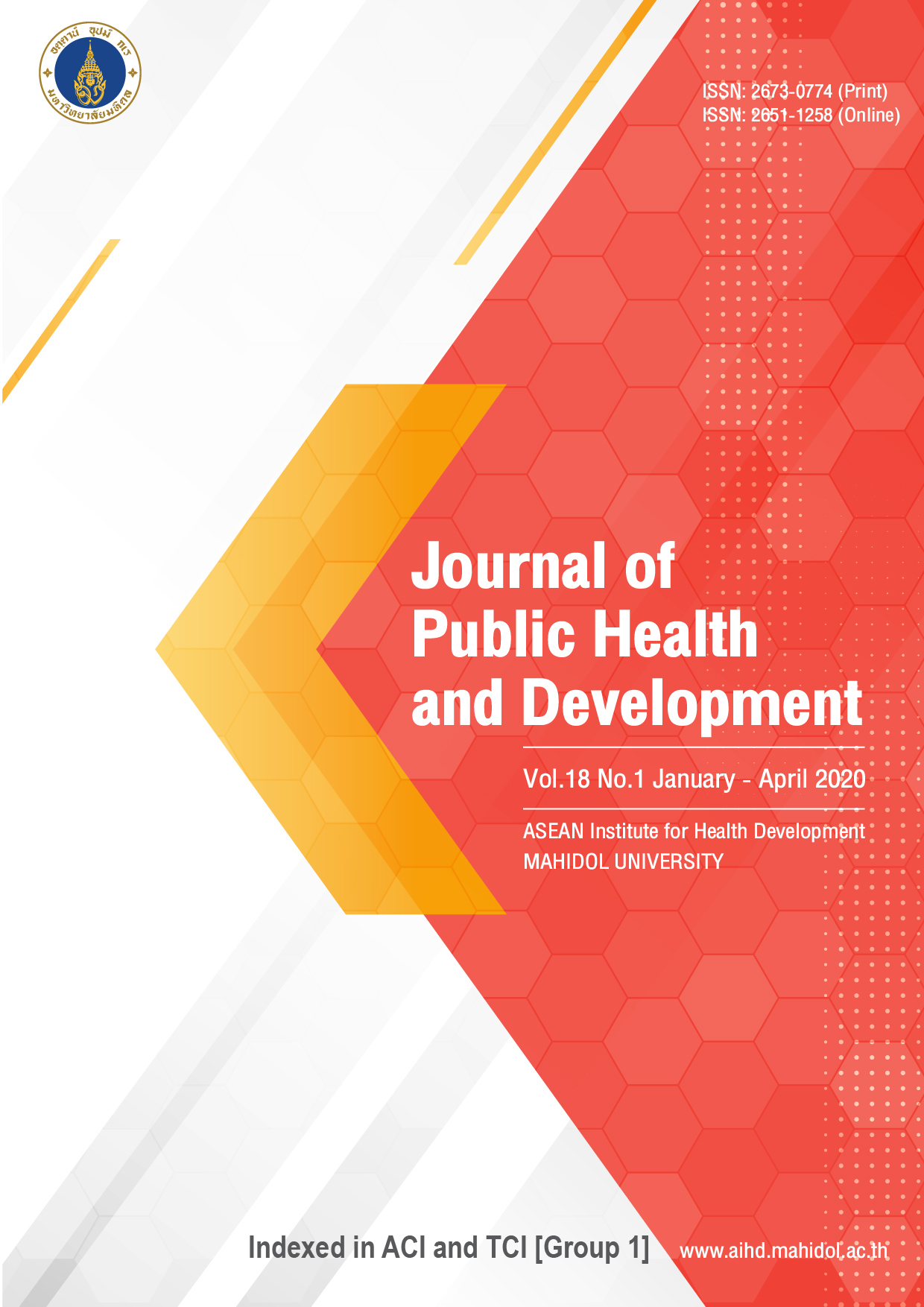Innovative mobile technology application to enhance healthcare and quality of life for senior citizens in Bangkok, Thailand
Main Article Content
Abstract
This research is aimed to explore the innovative mobile technology application incorporating smartphone (Apps), sport watch, mobile health devices, e.g. heart rate & blood pressure to enhance healthcare and quality of life for senior citizens in a district of Bangkok. The sample for this study was divided into two groups, one with active exercise and the other with less exercise. The questionnaires were designed to collect data on their demographics, health records, physical activity, and mobile health devices usage and skill. WHO’s quality of life questionnaire was also adapted to assess their quality of life. The population was between the ages of 50 to 70 with an average age of 61 years.
The research results indicated that all participants in this study were using the smartphone and at least one social network. Among the active group, 15% were using sport watch and 65 % were using mobile heart rate & blood pressure devices to monitor their exercise routine and health regularly. Concerning, health record, both groups showed 50 % cases of sickness. In the active group, 18% were found with non-communicable diseases (NCD), such as, Heart disease, Strokes, Diabetes, High blood pressure and Cancer; 15 % were found with bone-related sickness and 8% with allergy. The less exercise group was found with a higher rate of sickness with 31% NCD, 22 % bone sickness and 16% with allergy. For the quality of life (QOL), the active group showed a high level in all 5 aspects: physical health, mental health, social, living environment and sexual satisfaction whereas the less exercise group had lower scores in every aspect. There was a statistically significant difference (p<0.05) in the physical health aspect.
The innovative mobile technology could be applied to enhance healthcare and QOL for the seniors with active exercise and drive telehealth system.
Article Details
References
Knodel J, Teerawichitchainan B, Prachuabmoh V, Pothisiri W. The situation of Thailand’s older population: An update based on the 2014 Survey of Older Persons in Thailand. Research Collection School of Social Sciences. Paper 1948, 2015. Available from: https://ink.library.smu.edu.sg/soss_research/1948 (Accessed 2019 Apr. 4).
Narkprasit C. Application of Social Network in Healthcare Study of the Master’s Degree Students, Faculty of Education, from Kanchanaburi Province. International Journal of The Computer, The Internet and Management, (IJCIM) 2015; 23(SP2): pp 28.1-28.5.
Wallask S. Mobile technology in healthcare looks toward a brighter future. 2017. Available from: https://searchhealthit.techtarget.com/opinion/Mobile-technology-in-healthcare-looks...(Accessed 2019 Apr. 17).
So C F, Chung W Y. Telehealth for Diabetes Self-management in Primary Healthcare: A Systematic Review and Meta-Analysis. Journal of Telemedicine and Telecare, 2017 May 2.
Holmes W R, Joseph J. Social participation and healthy ageing: a neglected, significant protective factor for chronic non communicable conditions. Global Health, 2011; 7(43), doi:10.1186/1744-8603-7-43.
Park Y T. Emerging New Era of Mobile Health Technologies. Healthcare informatics research, 2016; 22(4): 253–254. doi:10.4258/hir.2016.22.4.253.
Ventola C L. Mobile devices and apps for health care professionals: uses and benefits. P & T : a peer-reviewed journal for formulary management, 2014; 39(5): 356–364.
Vaghefi I, & Tulu B. The Continued Use of Mobile Health Apps: Insights From a Longitudinal Study. JMIR mHealth and uHealth, 2019; 7(8): e12983. doi:10.2196/12983
Boulos M N, Brewer A C, Karimkhani C, Buller D B, & Dellavalle R P. Mobile medical and health apps: state of the art, concerns, regulatory control and certification. Online journal of public health informatics, 2014; 5(3): 229. doi:10.5210/ojphi.v5i3.4814.
World Health Organization. Telehealth, WHO 2019.Available from: https://www.who.int/sustainable-development/health-sector/strategies/telehealth/en/ (Accessed on 2019 Apr. 17).
Wikipedia. mHealth, 2019.Available from: https://en.wikipedia.org/wiki/MHealth (Accessed on 2019 Apr. 20).
Kumar S. Mobile Health Technology Evaluation: The mHealth Evidence Workshop. American Journal of Preventive Medicine, August 2013; 45 (2): 228-236.
Murfin M. Know your apps: an evidence-based approach to the evaluation of mobile clinical applications. J Physician Assist Educ. 2013; 24(3): 38–40.
Huang J C. Innovative Health Care Delivery System- a Questionnaire Survey to Evaluate the Influence of Behavioral Factors on Individuals’ Acceptance of Telecare, Computing Biology Medicine, May 2013; 43(4): 281-6.
Rutherford J. J. Wearable Technology. IEEE Engineering in Medicine and Biology Magazine, May-June 2010; 29(3).
Ananthanarayan S, Siek K. A. Persuasive Wearable Technology Design for Health and Wellness. 6th International Conference on Persuasive Computing Technologies for Healthcare and Workshops, 21-24 May 2012, IEEE 16 July 2012.
Bahramnezhad F, Chalik R, Bastani F, Taherpour M, & Navab E. The social network among the elderly and its relationship with quality of life. Electronic physician, 2017; 9(5): 4306–4311. doi:10.19082/4306.
Yamwong N. Quality of Life and Physical Activities of Daily Living Among Elderly Patients at HRH Princess Maha Chakri Sirindhorn Medical Center. Journal of Medicine and Health Sciences, April 2014; 21 (1): 37-44.
De Leo D, Diekstra R F W, Lonnqvist J, et al. LEIPAD, An Internationally Applicable Instrument to Access Quality of Life in the Elderly, Behavioral Medicine, 1998; 24(1): 17-27.
Free C, Phillips G, Galli L, Watson L, Felix L, Edwards P, et al. The Effectiveness of Mobile-Health Technology-Based Health Behaviour Change or Disease Management Interventions for Health Care Consumers: A Systematic Review. PLOS Medicine, January 2013;10(1): e1001362. https://doi.org/10.1371/journal.pmed.1001362
Heron K E, and Smyth J M. Ecological momentary interventions: Incorporating mobile technology into psychosocial and health behaviour treatments. British Journal of Health Psychology, January 2010; 15(1): 1-39. doi:10.1348/135910709X466063
Standing S, Standing C. Mobile technology and healthcare: the adoption issues and systemic problems. International journal of electronic healthcare. 2008 Jan 1;4(3-4):221-35.
Anderson K, Burford O, Emmerton L. Mobile Health Apps to Facilitate Self-Care: A Qualitative Study of User Experiences. PLOS ONE, May 2016; 11(5): e0156164. https://doi.org/10.1371/journal.pone.0156164.
Kuerbis A, Mulliken A, Muench F, Moore A A, & Gardner D. Older adults and mobile technology: Factors that Enhance and Inhibit Utilization in the Context of Behavioral Health. Mental Health and Addiction Research. April 2017; 2(2): 1-11, doi: 10.15761/MHAR.1000136.
Department of Mental Health. WHOQOL-BREF-THAI Questionnaire. Ministry of Public Health, 2019. Available from: https://www.dmh.go.th/test/whoqol/ (Accessed on 2018 Oct. 18), (in Thai).


